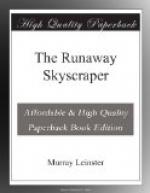He prowled about the vault exultantly, noting exactly how the cracks in the flooring ran and seeing in each a corroboration of his theory.
“I’ll have to make some inspections in the cellar,” he went on happily, “but I’m nearly sure I’m on the right track and can figure out a corrective.”
“How soon can we hope to start back?” asked Estelle eagerly.
Arthur hesitated, then a great deal of the excitement ebbed from his face, leaving it rather worried and stern.
“It may be a month, or two months, or a year,” he answered gravely. “I don’t know. If the first thing I try will work, it won’t be long. If we have to experiment, I daren’t guess how long we may be. But”—his chin set firmly—“we’re going to get back.”
Estelle looked at him speculatively. Her own expression grew a little worried, too.
“But in a month,” she said dubiously, “we—there is hardly any hope of our finding food for two thousand people for a month, is there?”
“We’ve got to,” Arthur declared. “We can’t hope to get that much food from the Indians. It will be days before they’ll dare to come back to their village, if they ever come. It will be weeks before we can hope to have them earnestly at work to feed us, and that’s leaving aside the question of how we’ll communicate with them, and how we’ll manage to trade with them. Frankly, I think everybody is going to have to draw his belt tight before we get through—if we do. Some of us will get along, anyway.”
Estelle’s eyes opened wide as the meaning of his last sentence penetrated her mind.
“You mean—that all of us won’t—”
“I’m going to take care of you,” Arthur said gravely, “but there are liable to be lively doings around here when people begin to realize they’re really in a tight fix for food. I’m going to get Van Deventer to help me organize a police band to enforce martial law. We mustn’t have any disorder, that’s certain, and I don’t trust a city-bred man in a pinch unless I know him.”
He stooped and picked up a revolver from the floor, left there by one of the bank watchmen when he fled, in the belief that the building was falling.
VII.
Arthur stood at the window of his office and stared out toward the west. The sun was setting, but upon what a scene!
Where, from this same window Arthur had seen the sun setting behind the Jersey hills, all edged with the angular roofs of factories, with their chimneys emitting columns of smoke, he now saw the same sun sinking redly behind a mass of luxuriant foliage. And where he was accustomed to look upon the tops of high buildings—each entitled to the name of “skyscraper”—he now saw miles and miles of waving green branches.
The wide Hudson flowed on placidly, all unruffled by the arrival of this strange monument upon its shores—the same Hudson Arthur knew as a busy thoroughfare of puffing steamers and chugging launches. Two or three small streams wandered unconcernedly across the land that Arthur had known as the most closely built-up territory on earth. And far, far below him—Arthur had to lean well out of his window to see it—stood a collection of tiny wigwams. Those small bark structures represented the original metropolis of New York.




